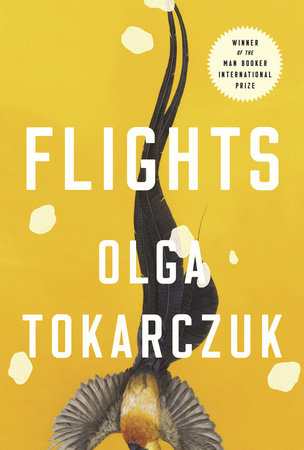Book Review: “Flights” — Exploring the Delights of the Eccentric
Given what Olga Tokarczuk is curious about, it is not surprising that her book serves up its share of goofy humor.
Flights by Olga Tokarczuk. Translated from the Polish by Jennifer Croft. Riverhead Books, New York, $26.

Author Olga Tokarczuk — the more far-fetched, bizarre, and absurd something may be, the more she is drawn in.
By Robert Israel
Olga Tokarczuk — who reads from her novel Flights in Boston on Sept. 25 — is a writer who is not afraid of hurling herself into high elevations. She not about staying on the ground, crafting a novel that develops characters and plot in the traditional sense. Instead, she catapults into the air in order to produce a book about travel and the human condition — a risky flight of fancy. The result is that she lands nimbly on her feet. Her book is a series of puzzle pieces that strangely — almost magically — conjoin. She has been rewarded for her daring efforts: this past spring she became the first Polish author to win the U.K.’s prestigious Man Booker International Prize for 2018.
The novel is composed of 116 vignettes, fictional forays juxtaposed among non-fictional, or essayist pieces, stitched together by using the voice of a female narrator (Tokarczuk herself). The book reminded me of a Paquito D’Rivera concert I attended years ago wherein the virtuosic jazz saxophonist announced from a Boston stage he would be performing a selection from Mozart that he was forced to learn as a music student in his native Havana, Cuba. “First I will play the Mozart, then I will destroy him,” D’Rivera declared, playing a few precise phrases from Mozart’s concerto before departing from the rigor of the score and taking us on a wild, cacophonic journey. Like D’Rivera, Tokarczuk chooses to take a similar rebellious trail. She writes early in the book that the task of being a novelist is “arduous.” It is “undoubtedly one of the worst ways of occupying oneself,” she confesses. So, to avoid what she defines as the “controlled psychosis” of fiction, she’s off on an adventure, and we’re invited to tag along.

And what a journey, albeit a rocky one, it is at times. Tokarczuk has a penchant for the macabre. She is indifferent to the fact that some may find nauseating what she sees finds compelling. She reports on her visit to a museum that I, too, once visited: the Mütter Museum of the College of Physicians in Philadelphia, known for its display cases of formaldehyde-preserved anatomical and pathological human specimens. She believes that, looked at closely, these specimens reveal a deeper meaning about our collective humanity: “Evidently, there was someone who recognized that these freaks of nature were owed immortality,” she writes, “and that only what is different will survive.” If you’re willing to suspend your revulsion, you’re in for quite a ride.
Along the way, you will read a fictional tale of the adventures of a certain Dr. Blau who takes sadistic pleasure by dissecting bodies. She writes a detailed account of Chopin’s sister Ludwika, who journeys back to her native Poland transporting the beloved composer’s heart beneath her dress. She tells us of another woman who returns to Poland to poison her terminally ill school paramour. She devotes a passage to a 17th century anatomist from Holland who discovers the Achilles tendon by performing a dissection of his own amputated legs. (She learned about this particular anatomist because she enrolled in an anatomy class at a university in Amsterdam.) The more far-fetched, bizarre, and absurd something may be, the more she is drawn in. And she writes about what interests her with verve:
Blau liked that, that mouth, just as he liked her body – petite, taut, breasts compact, nipples punctuating the velvety plane of her chest … Hips slender, though her thighs were quite substantial. Blau has always been attracted to powerful legs … A woman with powerful thighs is like a nutcracker: To venture between them is to risk being shattered. To venture between them is to disarm a bomb.
Given what Tokarczuk is curious about, it is not surprising that her book serves up its share of goofy humor. One vignette I especially enjoyed is titled “Sanitary Pads.” The author describes herself sitting in the bathroom, “where I unwrapped the entire box of these pads” in order to read the little facts written on the paper wrappers. The messages on these wrappers are along the lines of “did you know?” and include entries such as: “Scissors were invited by Leonard da Vinci,” or “The word ‘lethologica’ describes the state of being unable to recall the word you’re looking for.”
I recommend Tokarczuk’s book, even though I have reservations about some of subjects she chooses to examine. She answers a crucial challenge raised by Albert Camus: “A great writer always brings his own world and its message.” In an age of technology that cultivates short attention spans, we are always set in motion, internally if not externally. We move from place to place around the globe and around the internet, with no choice but to gather in more and more impressions. As we travel, strange inscriptions, oddities, factoids, and yes, repugnancies, whiz by. When we close our eyes to the spell of the peculiar, we turn away from our own reflections.
Robert Israel writes about theater, travel, and the arts, and is a member of Independent Reviewers of New England (IRNE). He can be reached at risrael_97@yahoo.com.
